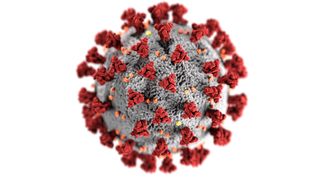Coronavirus Disease 2019
Loss of Smell or Taste Could Be a Symptom of COVID-19
Ear, nose, throat specialists are urging people with this symptom to stay home.
Posted March 26, 2020 Reviewed by Matt Huston
Recognized symptoms of the novel coronavirus include fever, cough, and shortness of breath, but ear, nose, and throat specialists are calling on public health authorities to acknowledge another symptom: changes in the senses of smell or taste.

In a press release, Claire Hopkins, President of the British Rhinological Society, and Nirmal Kumar, President of ENT UK, suggested that patients whose only symptom is a diminished or lost sense of smell "may be some of the hitherto hidden carriers that have facilitated the rapid spread of COVID-19."
The American Academy of Otolaryngology–Head and Neck Surgery, meanwhile, has proposed that loss of smell or taste be added to the list of symptoms that doctors use to screen patients for possible COVID-19 infection.
ENT UK – the professional membership organization for ear, nose, and throat specialists in the United Kingdom – reports that more than two-thirds of confirmed coronavirus patients in Germany have experienced a loss of smell. In South Korea, where officials have conducted widespread testing to catch mild and asymptomatic cases of COVID-19, 30% of patients who tested positive for the virus had loss of smell as their primary symptom.
Physicians in the U.S. and the U.K. are now observing these symptoms in their own practices, too. According to Hopkins: "I have personally seen four patients this week, all under 40, and otherwise asymptomatic except for the recent [loss of the sense of smell] – I usually see roughly no more than one a month. Unfortunately, these patients do not meet current criteria for testing or self-isolation."

What's the relationship between smell and taste?
First, it's important to understand that the senses of smell and taste are closely linked. Both rely on the same type of sensory cell, called a chemoreceptor, that activates when it comes into contact with certain types of chemical stimuli. Molecules in the air we breathe trigger the chemoreceptors in our noses, creating odors, while molecules in the food we chew trigger chemoreceptors in our mouths, creating tastes.
When we eat, though, our experience of flavor is actually the culmination of all the messages the brain is receiving from the nose, the mouth, and even the eyes and ears. Smell plays a particularly important role in flavor because of something called retronasal olfaction – you can think of this as your internal sense of smell.
As we chew and swallow, odor molecules from the food drift up through the back of the nasal cavity, where they activate smell receptors. The brain treats these internal odors differently than odors that are perceived through inhalation, and they play a major role in creating our perception of flavor.
So, anything that interferes with our sense of smell also has an impact on how food tastes to us.
COVID-19 and the sense of smell
Lost sense of smell (anosmia), reduced sense of smell (hyposmia), and changes in the sense of taste (dysgeusia) can be caused by head injuries, neurological disorders, allergies, growths in the nose, and even some medications. They can also be symptoms of a variety of illnesses that affect the upper respiratory tract, including colds, flus, and sinus infections. In fact, about 40% of patients recovering from viral infections report some decrease in their ability to smell.

Previously identified coronaviruses are believed to account for between 10% and 15% of cases of anosmia, so it wouldn't be surprising if the novel coronavirus now making its way around the world affects the sense of smell as well.
There are a few different reasons COVID-19 might have this impact. Inflammation in the mucous membranes of the nose as the body fights the virus could dull the sense of smell. Another possibility is that COVID-19 can enter the nervous system, damaging the cells that are responsible for relaying messages about odor to the brain.
Loss of smell or taste may be the only symptom in mild cases of coronavirus
Because screening procedures don't currently list the loss of smell or taste as a symptom, doctors may be missing some cases of COVID-19, enabling carriers of the virus to continue interacting with other people and spreading the illness.
ENT UK has released an infosheet advising anyone who experiences a sudden loss of smell or taste during the COVID-19 pandemic to:
- Assume they have COVID-19 until tests prove negative
- Self-isolate and have any friends or family members who live with them do the same
- Avoid visiting medical professionals or the hospital unless they have other symptoms requiring treatment
- Try smell training to improve this sense and to ease the boredom of isolation

Most of all, ENT UK encourages those who may be suffering from a coronavirus-related loss of their sense of smell to stay optimistic. The condition is unlikely to be permanent –many COVID-19 patients seem to regain their sense of smell in 7-14 days.
Moreover, people who have a mild case of COVID-19 will probably develop some immunity to the disease, which should bring a little peace of mind, although the organization notes that individuals who believe they've had a mild case of the illness should still "take all recommended precautions with regards to regular hand washing and social distancing once your period of self-isolation is over, particularly if you have not been tested."




